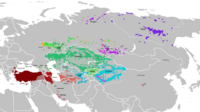| Revision as of 06:32, 23 February 2021 editDawnseeker2000 (talk | contribs)Autopatrolled, Extended confirmed users, File movers, New page reviewers, Pending changes reviewers, Rollbackers482,924 editsm date format audit, refine ref details (access dates are not required for links to published research papers, published books, or news articles with publication dates)Tag: AWB← Previous edit | Revision as of 21:34, 24 July 2021 edit undoWikiman2021language (talk | contribs)105 editsNo edit summaryNext edit → | ||
| Line 32: | Line 32: | ||
| }} | }} | ||
| '''Southern Uzbek''', also known as ''Afghan Uzbek'', is the southern variant of the ] and an official language of Afghanistan where it is based and has up to 4.2 million speakers. It uses the ] writing system in contrast to the language variant of ]. | '''Southern Uzbek''', also known as ''Afghan Uzbek'', is the southern variant of the ] and an official language of Afghanistan where it is based and has up to 4.2 million speakers. It uses the ] writing system in contrast to the language variant of ]. It uses the ] ].<ref>https://www.mustgo.com/worldlanguages/uzbek/#:~:text=Southern%20Uzbek%20has%20borrowed%20from,words%20and%20phrases%20in%20Uzbek.&text=Below%20are%20Uzbek%20numerals%201%2D10n%20Cyrillic%20and%20Latin%20scripts.</ref> | ||
| Southern Uzbek is intelligible with the Northern Uzbek spoken in Uzbekistan to a certain degree. However it has differences in grammar and also many more loan words from ] (in which many Southern Uzbek speakers are proficient).<ref>{{cite web|url=https://www.ethnologue.com/language/uzs|title=Uzbek, Southern}}</ref> | Southern Uzbek is intelligible with the Northern Uzbek spoken in Uzbekistan to a certain degree. However it has differences in grammar and also many more loan words from ] (in which many Southern Uzbek speakers are proficient).<ref>{{cite web|url=https://www.ethnologue.com/language/uzs|title=Uzbek, Southern}}</ref> | ||
Revision as of 21:34, 24 July 2021
| Southern Uzbek | |
|---|---|
| اوزبیکچه, اوزبیکی, اوزبیک تورکچه | |
 | |
| Native to | Afghanistan, Uzbekistan, Turkmenistan, Iran, Tajikistan, China, Saudi Arabia, Pakistan |
| Ethnicity | Uzbeks |
| Native speakers | 4.2 million (2017) |
| Language family | Turkic |
| Early forms | Middle Turkic |
| Writing system | Perso-Arabic |
| Official status | |
| Official language in | |
| Recognised minority language in | |
| Regulated by | Afghan Ministry of Education |
| Language codes | |
| ISO 639-3 | uzs |
| Glottolog | sout2699 |
| Linguasphere | db 44-AAB-da, db |
| This article contains IPA phonetic symbols. Without proper rendering support, you may see question marks, boxes, or other symbols instead of Unicode characters. For an introductory guide on IPA symbols, see Help:IPA. | |
Southern Uzbek, also known as Afghan Uzbek, is the southern variant of the Uzbek language and an official language of Afghanistan where it is based and has up to 4.2 million speakers. It uses the Perso-Arabic writing system in contrast to the language variant of Uzbekistan. It uses the Pashto alphabet.
Southern Uzbek is intelligible with the Northern Uzbek spoken in Uzbekistan to a certain degree. However it has differences in grammar and also many more loan words from Afghan Persian (in which many Southern Uzbek speakers are proficient).
Southern Uzbek Alphabet
Main article: Uzbek alphabet
Southern Uzbek is written using the Perso-Arabic writing system called Arab Yozuv ("Arab Script"). Although it contains the same 32 letters which are used in Persian, it pronounces many of them in a different way.
See also
References
- Southern Uzbek at Ethnologue (18th ed., 2015) (subscription required)
- Scott Newton (20 November 2014). Law and the Making of the Soviet World: The Red Demiurge. Routledge. p. 232. ISBN 978-1-317-92978-9.
- https://www.mustgo.com/worldlanguages/uzbek/#:~:text=Southern%20Uzbek%20has%20borrowed%20from,words%20and%20phrases%20in%20Uzbek.&text=Below%20are%20Uzbek%20numerals%201%2D10n%20Cyrillic%20and%20Latin%20scripts.
- "Uzbek, Southern".
External links
- Online Dictionary
| Languages of Uzbekistan | |
|---|---|
| Official language | |
| Regional languages | |
| Minority languages | |
| Sign languages | |
| Languages of Afghanistan | ||
|---|---|---|
| Official languages | ||
| Regional languages | ||
| Minority languages | ||
| Sign languages | ||
| Languages of China | |||||||||||||||||||||||||||||||||||||||||||||||||||||||||
|---|---|---|---|---|---|---|---|---|---|---|---|---|---|---|---|---|---|---|---|---|---|---|---|---|---|---|---|---|---|---|---|---|---|---|---|---|---|---|---|---|---|---|---|---|---|---|---|---|---|---|---|---|---|---|---|---|---|
| Official | |||||||||||||||||||||||||||||||||||||||||||||||||||||||||
| Regional |
| ||||||||||||||||||||||||||||||||||||||||||||||||||||||||
| Indigenous |
| ||||||||||||||||||||||||||||||||||||||||||||||||||||||||
| Minority | |||||||||||||||||||||||||||||||||||||||||||||||||||||||||
| Varieties of Chinese | |||||||||||||||||||||||||||||||||||||||||||||||||||||||||
| Creole/Mixed | |||||||||||||||||||||||||||||||||||||||||||||||||||||||||
| Extinct | |||||||||||||||||||||||||||||||||||||||||||||||||||||||||
| Sign |
| ||||||||||||||||||||||||||||||||||||||||||||||||||||||||
| |||||||||||||||||||||||||||||||||||||||||||||||||||||||||
| Turkic languages | |||||||||||||||||||||||||||||||||||||||||||||
|---|---|---|---|---|---|---|---|---|---|---|---|---|---|---|---|---|---|---|---|---|---|---|---|---|---|---|---|---|---|---|---|---|---|---|---|---|---|---|---|---|---|---|---|---|---|
| Proto-language |  | ||||||||||||||||||||||||||||||||||||||||||||
| Common Turkic |
| ||||||||||||||||||||||||||||||||||||||||||||
| Oghur | |||||||||||||||||||||||||||||||||||||||||||||
| Disputed classification | |||||||||||||||||||||||||||||||||||||||||||||
| Potentially Turkic languages | |||||||||||||||||||||||||||||||||||||||||||||
| Creoles and pidgins | |||||||||||||||||||||||||||||||||||||||||||||
| |||||||||||||||||||||||||||||||||||||||||||||